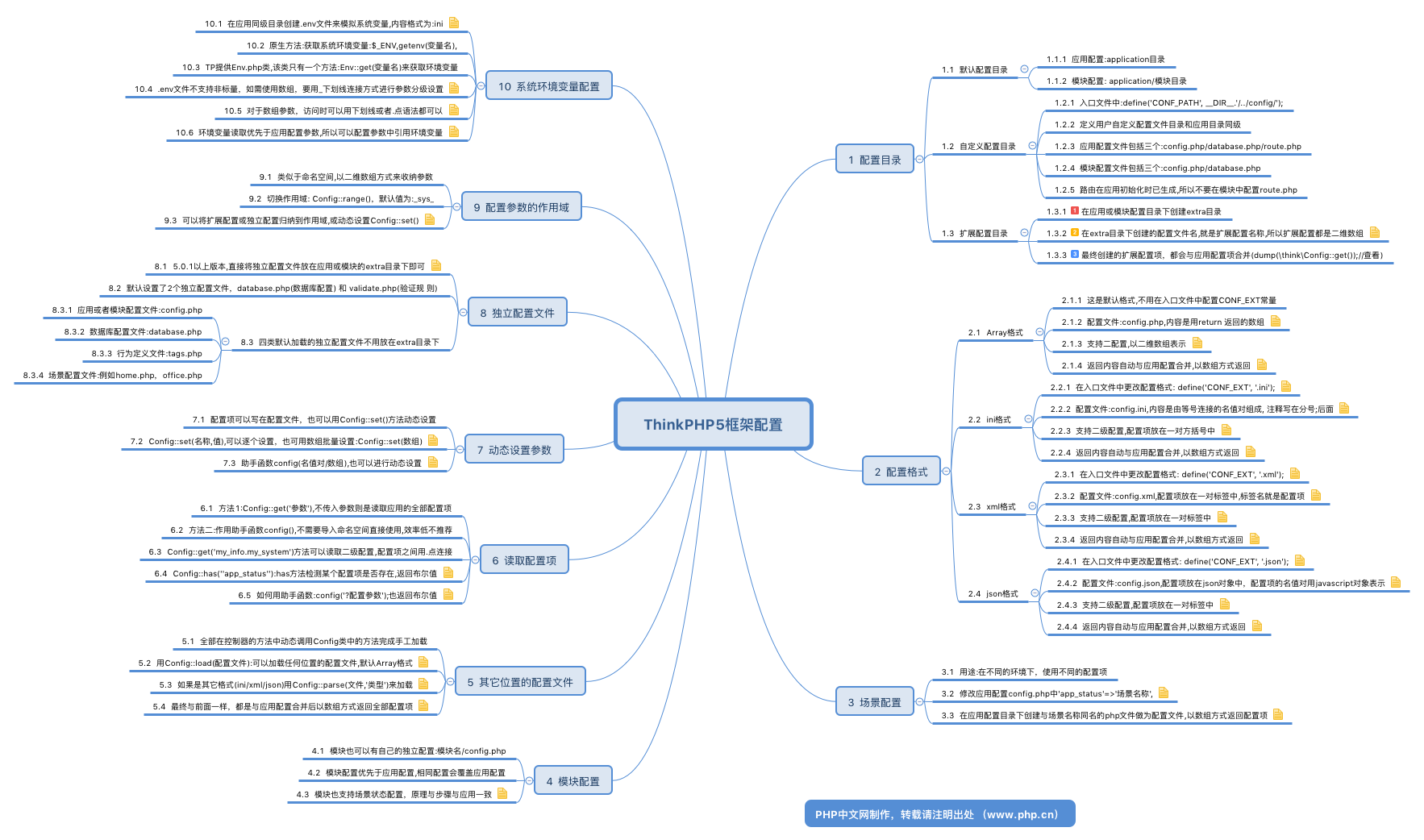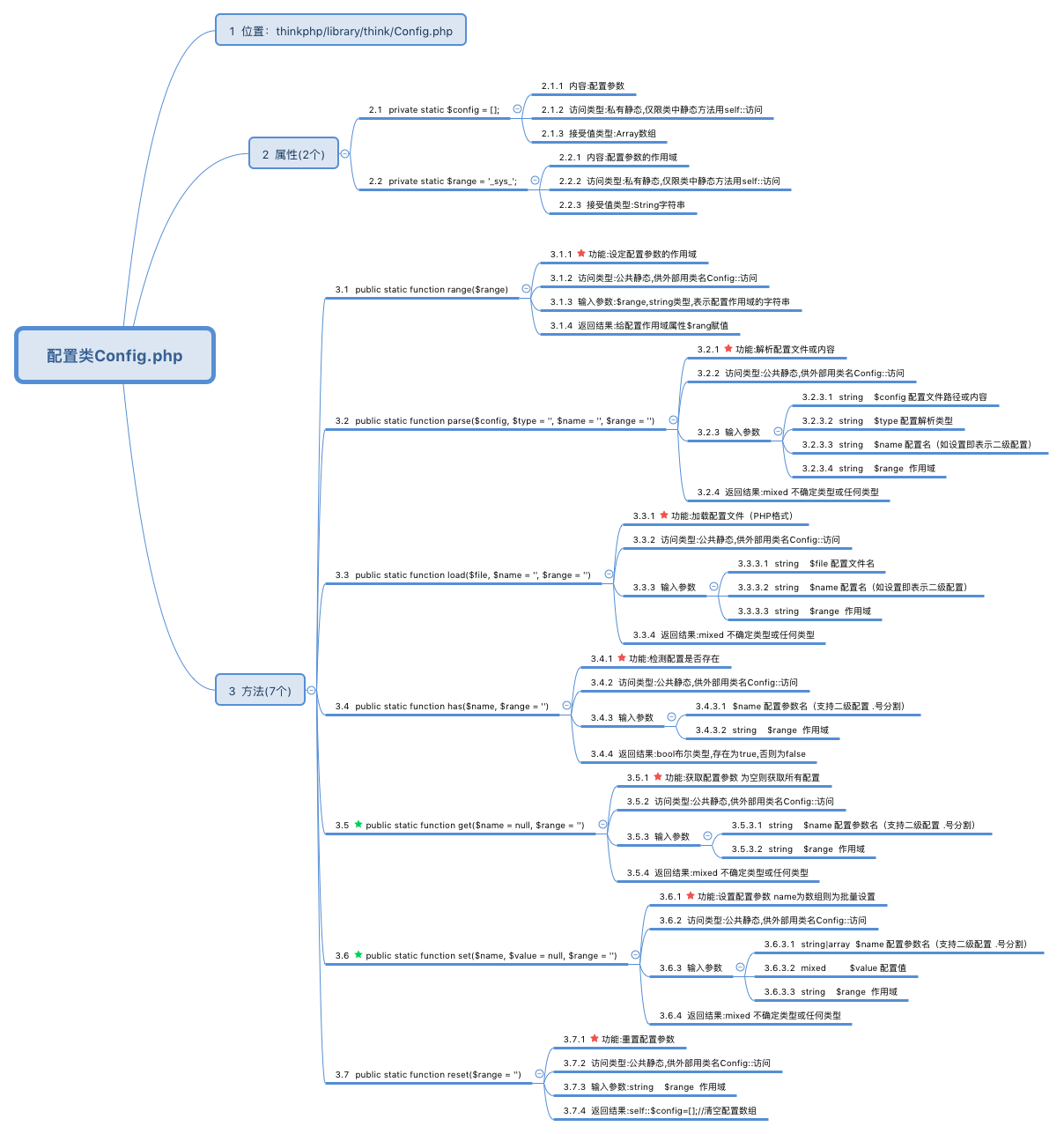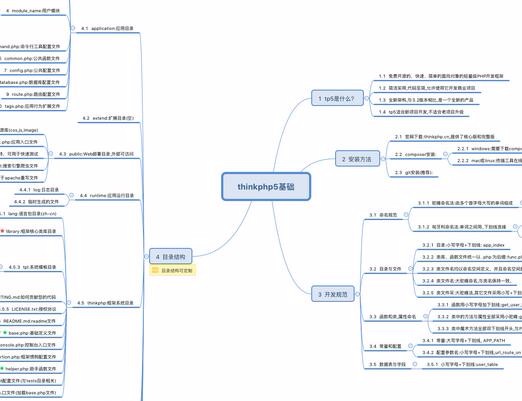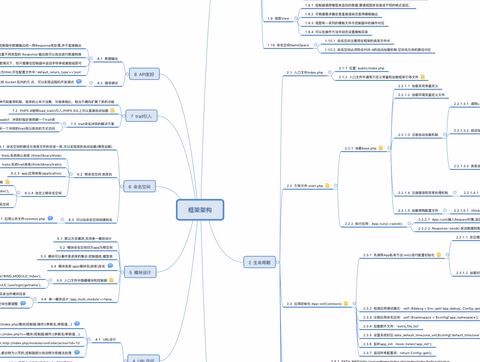Detailed introduction to thinkphp5 framework
This course is divided into 10 modules, from configuration file format (php/ini/json/xml) to scene configuration, module configuration, extended configuration, independent configuration, dynamic configuration, custom configuration loading, environment variable variables, panorama Showing a colorful ThinkPHP5 configuration world~~. Please open the picture to a new webpage to view it for better effect. Or download it to view locally. This picture is made by xmind mind map. There is xmind source file download at the bottom. It will be better to open it with xmind software. 1. Mind map: 2. File description: ThinkPHP5 framework configuration 1 Configuration directory 1.1 Default configuration directory 1.1.1 Application configuration: application directory 1.1.2 Module configuration: application/module directory 1.2 Custom configuration directory 1.2.1 Entry file :define('CONF_PATH', __DIR__.'/../config/');1.2.2 Define the user-defined configuration file directory and the application directory at the same level 1.2.3 The application configuration file includes three: config.p

Introduction: This course is divided into 10 modules, from configuration file format (php/ini/json/xml) to scene configuration, module configuration, extended configuration, independent configuration, dynamic configuration, and customization Configuration loading, environment variables, and a panoramic view of a colorful ThinkPHP5 configuration world~~
2. Illustration of ThinkPHP5 framework (3): Configuration class Config.php source code interpretation

Introduction: The configuration of ThinkPHP5 will affect the entire application life cycle. During the teaching, I found that many students I think it's enough if I can use it, but I don't want to look at the source code. This view is wrong. If you want to quickly improve your framework development level, reading the source code is the fastest way. In fact, the source code is not as obscure as everyone imagines. Starting from this lesson, I will take everyone together to slowly and quickly go through the source code of the main classes of ThinkPHP5. I believe that after finishing learning, you will feel like: [Wow, that’s it~~]!

Introduction: Based on the latest ThinkPHP5.0.8, the original work is xmind mind map production. If you feel that the picture is not clear, you can download the xmind source file and open it with xmind software.
4. Illustration of ThinkPHP5 framework (2): Application running process and life cycle

Introduction: One picture allows you to fully understand the ThinkPHP5 framework. It is summarized and organized during teaching, covering almost all knowledge points. Please feel free to add it to your collection.
5. php framework-How does thinkphp5 connect to SQL server2012?
Introduction: 1. I am using xampp on this machine, and the PHP framework is thinkphp5. Now because of the need, I need to develop on the sqlserver database. I want to pass thinkphp develops an application using sqlserver. 2. The main problem is using the thinkphp5 framework to connect to the local sqlserver...
6. Server - thinkPHP5 is deployed to a virtual host and cannot load the boot file?
Introduction: 1. Place the thinkPHP5 framework code on the virtual host. It cannot be accessed and prompts that the boot file cannot be loaded. 2. Screenshot of the situation: Picture description 3. I refer to https://www.kancloud.cn/manua... After placing the entry file in the root directory of the website, why can't I boot thinkphp5? ...
Introduction: Website The thinkphp5 framework is used. The server is built with wdcp and then uploads the public files to the /website/public_html directory. Other inaccessible framework files are placed in the /website/ directory. But when php requires some classes in the /website/ directory , he will prompt Fail...
[Related Q&A recommendations]:
How does the Thinkphp5 framework integrate the Propel framework?
php framework - How does thinkphp5 connect to SQL server2012?
server - thinkPHP5 is deployed to the virtual host and the boot file cannot be loaded. ?
The above is the detailed content of Detailed introduction to thinkphp5 framework. For more information, please follow other related articles on the PHP Chinese website!

Hot AI Tools

Undresser.AI Undress
AI-powered app for creating realistic nude photos

AI Clothes Remover
Online AI tool for removing clothes from photos.

Undress AI Tool
Undress images for free

Clothoff.io
AI clothes remover

Video Face Swap
Swap faces in any video effortlessly with our completely free AI face swap tool!

Hot Article

Hot Tools

Notepad++7.3.1
Easy-to-use and free code editor

SublimeText3 Chinese version
Chinese version, very easy to use

Zend Studio 13.0.1
Powerful PHP integrated development environment

Dreamweaver CS6
Visual web development tools

SublimeText3 Mac version
God-level code editing software (SublimeText3)

Hot Topics
 Explain JSON Web Tokens (JWT) and their use case in PHP APIs.
Apr 05, 2025 am 12:04 AM
Explain JSON Web Tokens (JWT) and their use case in PHP APIs.
Apr 05, 2025 am 12:04 AM
JWT is an open standard based on JSON, used to securely transmit information between parties, mainly for identity authentication and information exchange. 1. JWT consists of three parts: Header, Payload and Signature. 2. The working principle of JWT includes three steps: generating JWT, verifying JWT and parsing Payload. 3. When using JWT for authentication in PHP, JWT can be generated and verified, and user role and permission information can be included in advanced usage. 4. Common errors include signature verification failure, token expiration, and payload oversized. Debugging skills include using debugging tools and logging. 5. Performance optimization and best practices include using appropriate signature algorithms, setting validity periods reasonably,
 How does session hijacking work and how can you mitigate it in PHP?
Apr 06, 2025 am 12:02 AM
How does session hijacking work and how can you mitigate it in PHP?
Apr 06, 2025 am 12:02 AM
Session hijacking can be achieved through the following steps: 1. Obtain the session ID, 2. Use the session ID, 3. Keep the session active. The methods to prevent session hijacking in PHP include: 1. Use the session_regenerate_id() function to regenerate the session ID, 2. Store session data through the database, 3. Ensure that all session data is transmitted through HTTPS.
 What are Enumerations (Enums) in PHP 8.1?
Apr 03, 2025 am 12:05 AM
What are Enumerations (Enums) in PHP 8.1?
Apr 03, 2025 am 12:05 AM
The enumeration function in PHP8.1 enhances the clarity and type safety of the code by defining named constants. 1) Enumerations can be integers, strings or objects, improving code readability and type safety. 2) Enumeration is based on class and supports object-oriented features such as traversal and reflection. 3) Enumeration can be used for comparison and assignment to ensure type safety. 4) Enumeration supports adding methods to implement complex logic. 5) Strict type checking and error handling can avoid common errors. 6) Enumeration reduces magic value and improves maintainability, but pay attention to performance optimization.
 Describe the SOLID principles and how they apply to PHP development.
Apr 03, 2025 am 12:04 AM
Describe the SOLID principles and how they apply to PHP development.
Apr 03, 2025 am 12:04 AM
The application of SOLID principle in PHP development includes: 1. Single responsibility principle (SRP): Each class is responsible for only one function. 2. Open and close principle (OCP): Changes are achieved through extension rather than modification. 3. Lisch's Substitution Principle (LSP): Subclasses can replace base classes without affecting program accuracy. 4. Interface isolation principle (ISP): Use fine-grained interfaces to avoid dependencies and unused methods. 5. Dependency inversion principle (DIP): High and low-level modules rely on abstraction and are implemented through dependency injection.
 Explain late static binding in PHP (static::).
Apr 03, 2025 am 12:04 AM
Explain late static binding in PHP (static::).
Apr 03, 2025 am 12:04 AM
Static binding (static::) implements late static binding (LSB) in PHP, allowing calling classes to be referenced in static contexts rather than defining classes. 1) The parsing process is performed at runtime, 2) Look up the call class in the inheritance relationship, 3) It may bring performance overhead.
 What is REST API design principles?
Apr 04, 2025 am 12:01 AM
What is REST API design principles?
Apr 04, 2025 am 12:01 AM
RESTAPI design principles include resource definition, URI design, HTTP method usage, status code usage, version control, and HATEOAS. 1. Resources should be represented by nouns and maintained at a hierarchy. 2. HTTP methods should conform to their semantics, such as GET is used to obtain resources. 3. The status code should be used correctly, such as 404 means that the resource does not exist. 4. Version control can be implemented through URI or header. 5. HATEOAS boots client operations through links in response.
 How do you handle exceptions effectively in PHP (try, catch, finally, throw)?
Apr 05, 2025 am 12:03 AM
How do you handle exceptions effectively in PHP (try, catch, finally, throw)?
Apr 05, 2025 am 12:03 AM
In PHP, exception handling is achieved through the try, catch, finally, and throw keywords. 1) The try block surrounds the code that may throw exceptions; 2) The catch block handles exceptions; 3) Finally block ensures that the code is always executed; 4) throw is used to manually throw exceptions. These mechanisms help improve the robustness and maintainability of your code.
 What are anonymous classes in PHP and when might you use them?
Apr 04, 2025 am 12:02 AM
What are anonymous classes in PHP and when might you use them?
Apr 04, 2025 am 12:02 AM
The main function of anonymous classes in PHP is to create one-time objects. 1. Anonymous classes allow classes without names to be directly defined in the code, which is suitable for temporary requirements. 2. They can inherit classes or implement interfaces to increase flexibility. 3. Pay attention to performance and code readability when using it, and avoid repeatedly defining the same anonymous classes.






